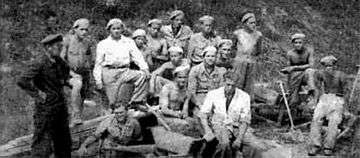Baudienst
| Baudienst | |
|---|---|
|
Baudienst in occupied Kraków (suburban Czyżyny area of the General Government territory), circa 1941. Second from right (leaning against massive wheel-barrel), is Karol Wojtyła, future Pope Saint John Paul II | |
| Labour battalions | |
| Period | Created in December 1940 |
| Territory | General Government |
| Victims | 45,000 Polish men and women |
| Designation | Forced labour with token compensation |
Baudienst (from German, lit. "building service" or "construction service"), full name in German Polnischer Baudienst im Generalgouvernement (Polish Service of Construction in the General Government), was the labour battalion created by Nazi Germany in the General Government territory of occupied Poland during World War II. Baudienst was subordinate to the Reichsarbeitsdienst (RAD, lit. "Reich Labour Service").
Formation and activities
The Baudienst construction was formed 1 December 1940, originally in the Kraków District of the General Government, but it eventually expanded to all districts of the newly-formed region, except for the Warsaw District. The goal of Baudienst was to provide the Third Reich with a large pool of obligatory labour force.[1]
Baudienst laborers were entitled to housing, food rations, working clothes, medical care and a wage of 1 złoty per day (a wage that was never changed, despite increasing inflation). Over time, conditions of work deteriorated, as laborers inhabited poor quality barracks (never a priority), and food and clothing rations were slashed.[1]
Baudienst was to build and maintain infrastructure (construction and repair of roads and canals), and aid with agricultural tasks. The overall objective was not to build infrastructure for the Poles, but for the Germans (with the aim of increasing West-East transport capacity in preparation for German invasion of Russia, and later, to improve the efficiency of German logistics). In some infamous cases, members of Baudienst were used to prepare graves for victims of German mass executions (of Poles, Jews and other victims of the Third Reich) [1] or to destroy Jewish houses and hiding places.
In the General Government, working was obligatory for any male Pole from 18 to 60 years old; later in the occupation this range extended to children from 14 years old. Baudienst service itself was an obligatory service for Poles aged 21 – 22. Germans were aiming to have as may as 150,000 Baudienst members, in fact due to constant lack of volunteers and increasing desertions, Baudienst at its height reached less than a third of that number (about 45,000 people).[1]
Baudienst workers (some volunteers, but most were conscripted) were under a contract to work at least initially 3 months, increased up to 6–7 months of work during the spring-summer period and eventually a minimum of a year.[1]
In addition to the Polish Baudienst, Germans created similar Heimatdienst (lit. "homeland service", Ukrains'ka Sluzhba Bat'kivschyni, USB) for the Ukrainians, and a similar one for the Goralenvolk. Volksdeutsche were immune from the service (but could volunteer, and some did for the higher-ranking positions such as foreman), and Polish Jews were already forced to labor in the ghettos and labor-concentration camps.[1]
See also
External links
- Axis Forum
- (Polish) Elżbieta Laska, Praca przymusowa Polaków na rzecz III Rzeszy
- (Polish) Okupacja niemiecka, cz.4
- (Polish) Bezkarni oprawcy z Baudienst, gazeta.pl, 2007-07-20
- Racial research
Further reading
- Mścisław Wróblewski, Służba Budowlana (Baudienst) w Generalnym Gubernatorstwie, 1940–1945, 1984, Państwowe Wydawn. Nauk. (Warszawa), ISBN 83-01-04986-3
- Jan Grabowski, Hunt for the Jews: Betrayal and Murder in German-Occupied Poland, 2013
